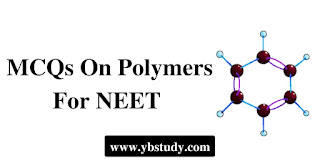MCQs on polymers for class 12 NEET
MCQs on polymers for NEET
If you are looking for Multiple Choice Questions on polymers mcqs pdf for NEET Here we collected some important polymers mcqs pdf for class 12th. The mcq pdf for class 12th included in this page have been selected based on the popular questions asked in various competitive exams over the years.
1) Which of the following is a naturally occurning polymer?
a) Nylon
b) Starch
c)Teflon
d) Neoprene
Answer -: b
2) Which of the following is an example of addition polymer?
a) Teflon
b) Nylon-6
c) Bakelite
d) Nylon-66
Answer -: a
3) Which of the following has amide linkage?
a) Nylon-66
b) Bakelite
c) Teflon
d) Terylene
Answer -: a
4) The monomer units in Buna S are butadiene and______
a) vinyl chloride
b) adipic acid
c) Styrene
d) none of these
Answer -: c
5) Which of the following is thermoplastic ?
a) terylene
b) nylon
c) polyethylene
d) all
Answer -: c
6) Which of the following is a polyamide?
a) nylon
b) terelene
c) PVC
d) all
Answer -: a
7) Which of the following has an ester linkage?
a) nylon
b) PVC
c) terelyne
d) bakelite
Answer -: c
8) The process of vuleanisation is at ion of rubber makes it________
a) souble in water
b) hard
c) soft
d) less elastic
Answer -: b
9) The monomer of polyacrylonitrile is____
a) vinyl chloride
b) vinyl alcohol
c) vinyl cyanide
d) adipic acid
Answer -: c
10) Isoprene polymerises to______
a) starch
b synthetuc rubber
c) natural nubber
d) PVC
Answer -: c
11) Which of the following is not an example of addition polymer.
a) Polystyrene
b) Polyethylene
c) polypropylene
d) Terylene
Answer -: d
12) Glyptal is a polymer of______
a) Ethylene glycol and phthalic acid
b) Ethylene glycol and terephthalic acid
c) Ethylene glycol and adipic acid.
d) Caprolactum and formaldehyde
Answer -: a
13) The S in Buna-S refers to______
a) sulphur
b) sodium
c) styrene
d) strain
Answer -: c
14) Which of the following is not a condensation polymer?
a) Glyptal
b) Terelene
c) polystyrene
d) Nylon 66
Answer -: c
15) Bakelite is a_______
a) Formaldehyde resin
b) Phenol formaldehyde resin
c) Artiicial rubber
d) None of these
Answer -: b
16) The constituents of Nylon-66 are____
a) Benzoic acid and ethylamine
b) Phthalic acid and hexamethylene diamine
c) Phenol and adipic acid
d) Adipic acid and hexamethylene diamine
Answer -: d
17) Which of the following is a polymer containing nitrogen?
a) Terylene
b) Teflon
c) PVC
d) Nylon
Answer -: d
18) Terylene has the monomer units ethylene glycol and____
a) adipic ‘acid
b) formaldehyde
c) phthalic acid
d) dimethyl terephthalate
Answer -: d
19) Teflon s a polymer of______
a) F2C=Cf2
b) CIFC=CH2
c) FCH= CHF
d) Cf2- CF3
Answer -: a
20) Polyacryiates contan the linkages of_______
a) amides
b) esters
c) alcohols
d) nitriles
Answer -: d
21) For the formation of fibre,
a) monomers must contain tetrahedral geometry
b) monomers have high tensile strength
C) monomers must have complex structure
d) monomers must contain linear geometry
Answer -: d
22) Which of the following is not a polymer?
a) cellulose
b) rubber
c) protein
d) fructose
Answer -: d
23) Which of the following is commonly called synthetic cellulose?
a) dacron
b) terylene
c) rayon
d) nylon
Answer -: c
24) In which of the following polymerization new bonds are formed by the elimination of small molecules?
a) s imple
b) condensation
c) coordination
d) addition
Answer -: b
25) Which of the following is not a plant fibre?
a) jute
b) cotton
c) linen
d) silk
Answer -: d
26) The number of repeating units in a polymer is_______,
a) about 5 to 6
b) small
c) about 20 to 30
d) relatively large
Answer -: d
27) Chemically, pure cotton is named as,_______
a) viscous rayon
b) cellulose
c) protein
d) acetate rayon
Answer -: b
28) Ethylene glycol contains how many secondary alcoholic
a) 1
b) 0
c) 2
d) 3
Answer -: b
29) The main constituent of most natural plant fibres is_______
a) glycogen
b)starch
c) cellulose
d) ghucose
Answer -: c
30) The compound used in the manulacture of terylene is _____
a) ethylene glycol
b) ethylene
c) adipic acid
d) vinyl chloride
Answer -: a

